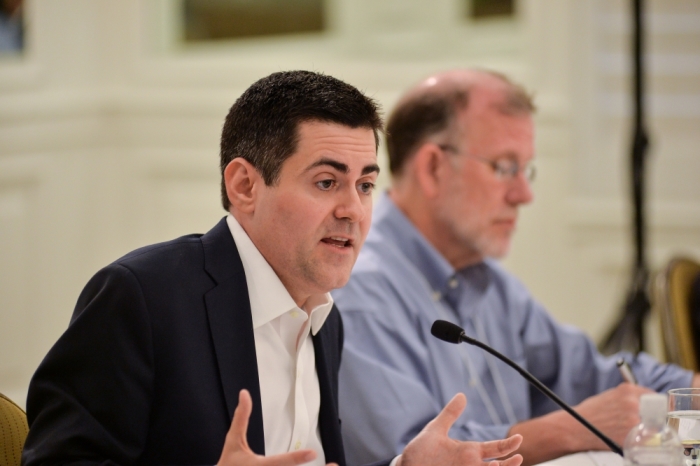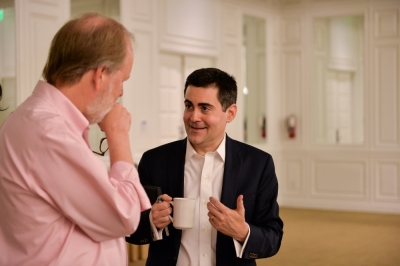Russell Moore: Young Evangelicals Reject Christian Right, But Not Moving Left; Prefer to Be Freakish

MIAMI BEACH — Younger Evangelicals are rejecting the style and methods of the Christian Right but they are not becoming liberals, Russell Moore, president of the Southern Baptists Convention's Ethics and Religious Liberty Commission, contended Tuesday at the Ethics and Public Policy Center's Faith Angle Forum. Instead, they are embracing a counter-cultural, "freakish" message tied to the Gospel.
The culture wars are entering a new phase, Moore said, and in this new era, Christians should be more like the Grateful Dead than Merle Haggard.
In the early days of the Christian Right, Christians adopted a language similar to Haggard's "Okie from Muskogee" and "The Fightin' Side of Me," two 1969 country hits that viewed liberals of the time as out of touch with the rest of America, he argued. Moving forward, Moore said, Evangelicals' message should be more like a line from the Grateful Dead's 1987 hits "Touch of Gray:" "It's even worse than it appears but it's alright."
"I don't think the culture wars are over, but I think the culture wars are moving into a new phase and will be different from what we saw in the last generation of the Religious Right," he said.
Whereas an earlier generation of Evangelicals saw themselves as part of a moral majority fighting a small, elite group of liberals, the new generation will be seen as "freakish" and "strange" to the surrounding culture, Moore believes, and this is a positive development for Evangelical Christianity.
Evangelicals have lost the illusion that they are a majority in America, he said, and "I think that is a good thing for the Gospel and for the Church."
While Americans have traditionally viewed church participation as necessary for acceptance in their communities, Moore believes that will no longer be the case. This means that there will be fewer "nominal Christians," or those who call themselves Christian but are not committed to the faith. With this "reverse rapture" of nominal Christians leaving the Church, Moore sees an opportunity for the Church to rediscover its true mission.
"Moving into a more secularizing time gives the Church the opportunity to refocus on what the Gospel is," he said. Citing 1 Corinthians 5, where Paul advises the Church in Corinth on how to deal with sexual immorality in the Church, Moore added that the Church needs to draw lines between "those on the inside from those who are on the outside ... not in terms of level of discernment but in terms of accountability."

These changes do not mean that Evangelicals are withdrawing from or moving Left in the culture wars.
"Younger Evangelicals are suspicious and skeptical of politicians," he said, but that "does not mean they are moving to adopt another group of politicians," it just means that they "don't want to baptize political leaders as spiritual leaders."
"An Evangelical that would seek to claim Glenn Beck or Donald Trump as a Christian leader, or an Evangelical that would seek to claim Thomas Jefferson or Benjamin Franklin as an Evangelical leader is a liberal," Moore explained, because that is "not consistent with what biblical orthodoxy is."
As young Evangelicals become more involved in politics, Moore believes their activities will be more narrow in one sense and more broad in another sense than previous generations. It will be narrower because they will be less likely to claim there is a biblical position for specific political positions like the line-item veto or a balanced budget amendment. It will be broader because they are concerned about issues beyond life and marriage, such as human trafficking, orphan care, domestic abuse and creation stewardship.
There is "not a weariness of the culture wars" among young Evangelicals, Moore said. Rather, they "do not want to return to the mode of discourse" of the Christian Right.
The style of young Evangelicals can sometimes confuse outsiders, Moore explained. They may have tattoos or nose rings, for instance, which may lead some to assume they are liberal. But "in many cases, theologically speaking, they are to the right of their parents and grandparents."
Young Evangelicals are also rejecting the "seeker sensitive movement" of the previous generations, Moore has observed, "that turned the biblical text into the equivalent of Aesop's fables." Instead, they are "dealing with complex text" and have a "robust sense of church discipline" and "accountability to one another," including on the issue of divorce.
Whereas Moore has previously observed a reluctance to talk about divorce in churches, he increasingly hears the topic being brought up by young Evangelicals who have often "experienced the divorce of their parents and the wreckage of the divorce culture."
Citing the example of a Bible that was designed to look like a fashion magazine and was marketed to young girls, Moore said that "many Evangelicals had, and still have to some degree," the impulse to "make Christianity less freakish."
Unlike previous generations, though, Moore believes today's young Evangelicals will embrace their freakishness. For Moore, this is both a prediction and a prescription. He does not want the Church to "make Christianity marketable by making Christianity normal."
"We should embrace the freakishness of Christianity because it enables us to talk clearly about what really matters," he said. "Christianity didn't emerge in Mayberry, it emerged in a Greco-Roman empire that found [Christ's] claims very strange."
EPPC's Faith Angle Forum brings journalists together twice a year for in-depth discussions with experts and practitioners on topics related to faith and culture. At the March event, there were also panels on sin and Pope Francis.




























